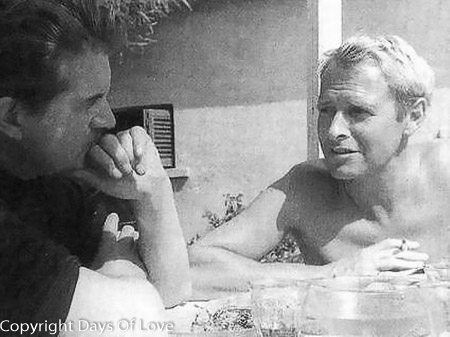

Partner Paul Danquah
Queer Places:
Sharlowes Farm House, Flaunden, Hemel Hempstead HP3 0PP, UK
9 Prince of Wales Dr, London SW11 4SB, Regno Unito
Boubana Municipal Cemetery, Tangeri, Marocco
 Peter Pollock (November 19, 1919 - July 28, 2001) was a friend and supporter of
Francis Bacon who in his fifties
moved to Morocco and bought a restaurant, the Pergola, which became famed
for serving the finest plate of swordfish and chips on the North African
coast. Thirty-five of the art-works given him by Bacon formed, with four
drawings given to Sir Stephen Spender, the bulk of the Tate Gallery's
exhibition "Francis Bacon: works on paper and paintings" earlier this
year.
Peter Pollock (November 19, 1919 - July 28, 2001) was a friend and supporter of
Francis Bacon who in his fifties
moved to Morocco and bought a restaurant, the Pergola, which became famed
for serving the finest plate of swordfish and chips on the North African
coast. Thirty-five of the art-works given him by Bacon formed, with four
drawings given to Sir Stephen Spender, the bulk of the Tate Gallery's
exhibition "Francis Bacon: works on paper and paintings" earlier this
year.
Born in 1919, Pollock was part-heir to the Accles & Pollock empire – a Midlands-based and highly successful light engineering company co-founded in 1901 by his grandfather Thomas Pollock. In the 1950s the names Accles & Pollock were juxtaposed nationwide on massive hoardings, suggesting all manner of interesting spoonerisms – an innovative form of advertising considered quite racy in its day.
Spurning a possible "reserved occupation" career in light engineering, the young Peter Pollock was an eager volunteer for military service at the start of the Second World War. He gained a commission in the Gordon Highlanders and served, as a captain, both in North Africa and in Italy, where he was taken prisoner.
After demob, and despite his spending four humdrum years in a German POW camp, the idea of a career in Midlands light engineering seemed no more exciting to Pollock than it had done at the start of hostilities. Instead, he bought a farm in Flaunden, Hertfordshire, and took up the life of a gentleman farmer, combining a dairy herd with pig-farming, greyhound breeding and, in the lazy summer afternoons, idling through the leafy Hertfordshire lanes in his vintage Rolls.
Continually frustrated at what he considered to be his own lack of creative achievement, Pollock had an unquenchable passion both for the arts and the company of artists. Sundays provided open house at the Flaunden farm for painters, writers, actors and actresses.
A constant visitor was the then little-recognised painter Francis Bacon. Lacking a home of his own, Bacon enjoyed a come-and-go-as-he-pleased existence, both at the Flaunden farm and at a flat, overlooking Battersea Park in London, which Pollock also owned. Pollock allowed the young Bacon a rent-free life over the years 1955-61– a kindness which the painter acknowledged by leaving behind the occasional picture in unspoken payment.
Another young man whom Pollock took pity on and befriended – and who was destined to become his lifetime companion – was Paul Danquah. Danquah's father, J.B. Danquah, had been a minister in Kwame Nkrumah's government in Ghana, but a change in regimes had resulted in his temporary imprisonment. Paul Danquah, at that time studying for the Bar at the Inner Temple, was left unfunded. Pollock's generosity enabled Danquah to complete and pass his Bar studies – but the young Danquah, inspired perhaps by Pollock's artistic leanings, was temporarily to abandon his legal career when he was cast opposite Rita Tushingham in the Tony Richardson directed film of Shelagh Delaney's stage success A Taste of Honey (1961). (He was also to have parts in the Morecambe and Wise vehicle That Riviera Touch, 1966, and, as "2nd Exquisite", in the satire Smashing Time, 1967, written by George Melly.)
The fast life at Flaunden, slow greyhounds and an over-generous nature finally resulted in Pollock's selling up the farmstead and moving on. It was in the Colony Club in Soho, presided over by the redoubtable Muriel Belcher, that, with his artistic friends including Bacon and John Minton, Pollock had first heard tales of the exciting and exotic life that beckoned in Morocco. Upping sticks in the late 1970s, Pollock and Danquah set up home in Tangier, where notoriety was fast making Morocco fashionable.
Pollock acquired the Pergola, a bar and restaurant on the Tangier seafront, where word of the new owner's culinary skills soon spread. The "Flaunden set" of friends remained ever-faithful and followed Pollock and Danquah out to Tangier at holiday-times. John Lahr's 1978 biography of Joe Orton, Prick Up Your Ears, includes a photograph of the playwright with Kenneth Halliwell and Kenneth Williams enjoying themselves at the Pergola. Pollock's expertise in the kitchen was overshadowed only by his generosity of spirit. "No, my dear, I absolutely insist – this one's on me" might provide a fitting memorial.
Peter Pollock suffered a severe stroke in 1999, which left him an invalid. A second stroke, in July, ended his life.
The extent of Francis Bacon's gratitude for his mentor's hospitality came to light only a couple of years ago, when a suitcase, which had gathered dust for decades underneath a bed in a spare room at the Pollock and Danquah home in Tangier, was found to contain a hoard of the painter's early work. It was Peter Pollock's innate patriotism which ensured that those paintings were acquired by the Tate Gallery, rather than offered on the open market.
My published books: